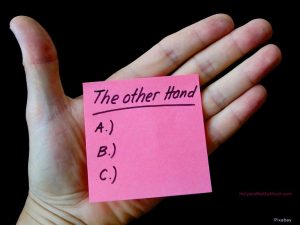Silence, I have come to value silence. I live in a sound soaked world.
–Cloud Walking, Bishop Steven Charleston
As a schoolgirl, nothing struck terror in my soul like being called to the chalkboard to solve a math problem. Typically I stood facing the board, frozen and whimpering.
I did learn from those experiences, but nothing constructive.
Even as a pharmaceutical rep, I was anxious two weeks before a sales meeting. The rigor of videotaped sales contests before managers and colleagues unnerved me. Though my sales performance was excellent, I was miserable at these gatherings.
Once, after church, my friend Judy and I chatted as we gobbled cookies we had sworn we wouldn’t eat. She observed, “Well, you’re an introvert.” The secret was evidently out, though I told myself no one noticed.
Judy is right; I am an introvert. Dad said that when I was twelve, I went to my room and came out when I was seventeen and left for college. Actually, my need for solitude began very early.
When I was seven I sometimes woke early on Saturday morning. Since early waking is akin to rising from the dead for me, this is quite telling. The motivation was simple, a strong desire for private time. Down to the end of the hall I tip-toed for my secret ritual, to the last room by the back stairwell.
No one in the house knew of the standing date each Saturday; it was with Shirley Temple. If you are young, you may not appreciate her significance. Shirley Temple was a tiny Dakota Fanning, Taylor Swift and Julianne Hough rolled into one. She was a force of nature, and I adored her.
In my little sanctuary, I watched her movies, sang, and danced with all the abandon a seven-year-old could muster. Uninterrupted, I could dream my own stories. There was something else there too; God was in my secret world, in the quiet. This time in solitude left an indelible impression on me; I still remember a few of the songs Shirley sang. “Goodnight my love; the tired old moon is descending. Goodnight my love, it’s time to call it a day.” (Benny Goodman)
Sometimes introversion is misinterpreted as a judgment against the company of others or as aloofness. It is neither of those. Extroverts need the energy others give and prefer the company of others to being alone. Introverts enjoy their own company and have no dread of being alone, even for extended periods. They do not look to “engage” for a solution to boredom or loneliness. The answer is not “out there” for us.
When I attended those sales meetings, I was threadbare by the close of the meeting. It was too much for me, sharing a hotel room, role-playing in front of a room full of people, rising early to spend the entire day shoulder-to-shoulder with people you hardly know. Just shoot me.
You may be asking how an introvert could succeed in a sales career. The answer is that I can be very effective one-on-one. Introverts often possess a quiet, focused strength not recognized by those who value more extroverted traits such as boldness, aggression, gregariousness, or volume. Most, unfortunately, society also places more value on those behaviors. Consider the popularity of belligerent social media, the abrasive Facebook posts, YouTube videos, and tweeting every thought that pops into one’s head.
Bishop Steven Charleston says we live is a “sound soaked world.” I agree with him.
“Today’s psychologists tend to agree on several important points. For example, that introverts and extroverts differ in the level of outside stimulation they need to function well.” Quiet, the Power of Introverts in a World that Can’t Stop Talking—Susan Cain
At the end of the day, I do not want to socialize or play competitive games; I have had enough of that stimulation all day long. I have no need to reach for my cell phone or go out to socialize.
“According to studies by psychologist Hans Eysenck, introverts require less stimulation from the world in order to be awake and alert than extroverts do. This means introverts are more easily over-stimulated. The flip side of introverts’ sensitivity to dopamine is that they need less of it to feel happy. Extroverts’ brains run on an energy-spending nervous system, whereas introverts’ brains run on an energy conserving nervous system. This is why introverts feel content and energized when reading a book, thinking deeply, or diving into their rich inner world of ideas.” (Quiet, Susan Cain)
Evidently, the Amygdala of the brain is the epicenter that triggers emotional responses to danger. In studies with infants, highly reactive children were easily overstimulated. They have more blood flow to the brain than extroverts, enhancing traits such as good memory and planning. These overly stimulated infants become introverts as adults.
Spending time alone has fostered a contemplative spiritual nature, which has cultivated my ability to navigate our noisy world. If I do not have time alone to read, write, and meditate, I am out of sorts. I need this as much as I need sleep or air.
Life only in the bubble is not rich and expansive, though. I am grateful for many deep, long-term friendships. Yet, I celebrate my true nature and honor it with quality time spent in quiet also.
Perhaps you, too, are a tad overstimulated now. I invite you to quiet, take a step back. Your Amygdala will feel much better.





Karen, we are twins from different parents!!! You are singing my song!!! Have to be able to recharge my battery!!!My family gives me grief but I know myself!!!
Love you, girl!
Laura